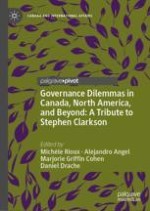This book discusses the development of Canadian political economy through the legacy of Stephen Clarkson, who for over 40 years analyzed the challenges that economic changes brought to the economic governance of Canada, North America, and the world. Tracing the main themes of Clarkson scholarship, it explores in four sections how changes in the global economy, such as regional and inter-regional trade agreements, impact the political economy of Canada and North America, the focus of most of Clarkson’s works, without leaving aside the rest of the world. The book is divided in four main sections that correspond to Clarkson’s scholarly contributions. The epilogue takes a personal tone and presents how the legacy of Stephen Clarkson serves as an inspiration for scholars facing a different world.
